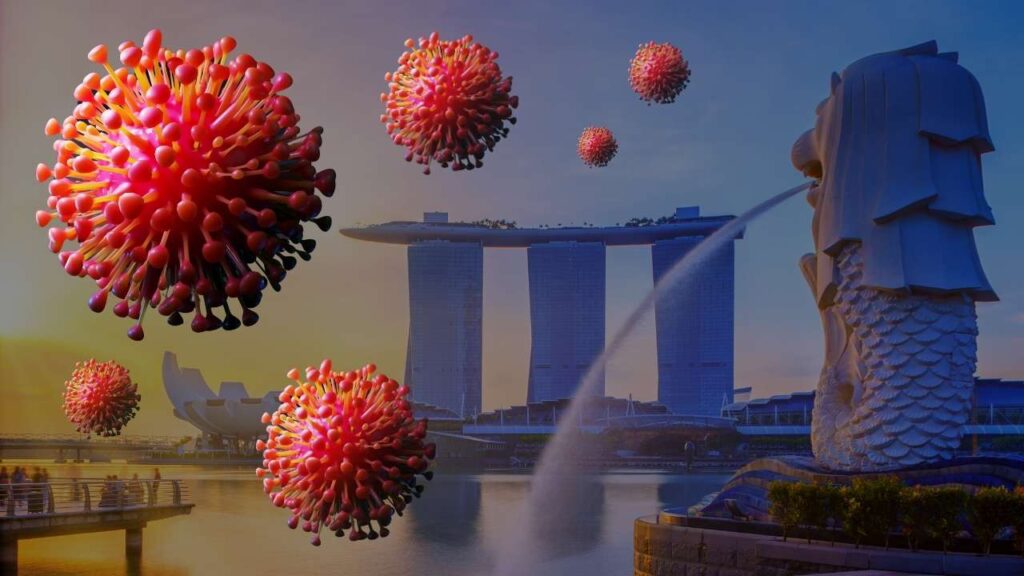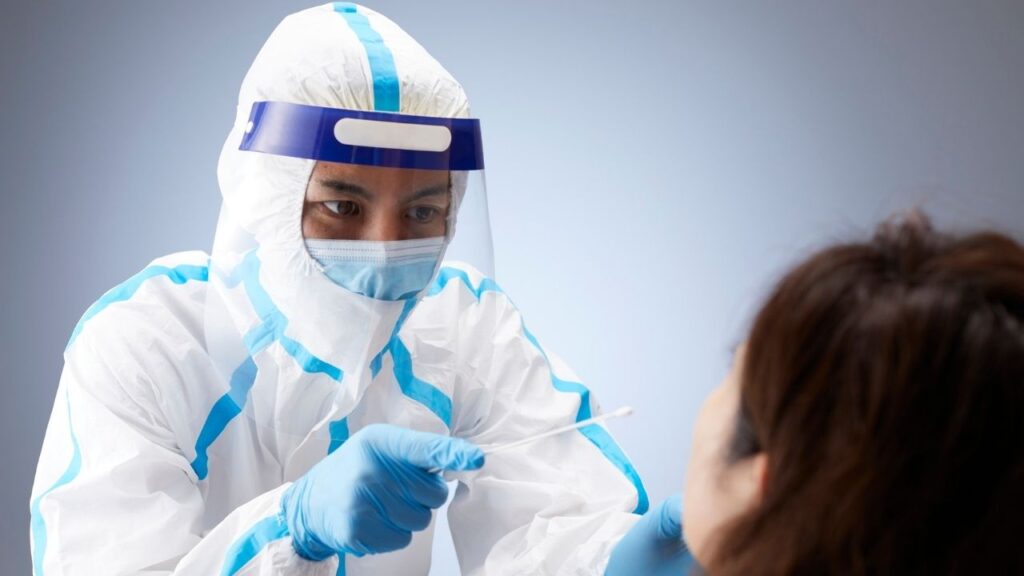Singapore Covid-19 cases are rising sharply, making headlines across Asia alongside a spike in Hong Kong.
COVID-19 is making headlines once again in Asia as countries like Singapore and Hong Kong report a notable resurgence in infections. With the latest spike in cases, health authorities are urging citizens, especially vulnerable groups, to update their vaccinations and stay vigilant.
Table of Contents
Singapore Covid-19 Cases Surge 28% in a Week
Singapore’s Ministry of Health (MOH) has reported a 28% increase in estimated COVID-19 cases, climbing from 11,100 to 14,200 in the first week of May. Hospitalizations have also seen a sharp 30% increase, rising from 102 to 133 cases. Despite this, authorities stress that there is no indication that the current variants—primarily LF.7 and NB.1.8—are more transmissible or severe than previous strains.

Both variants are sub-lineages of the JN.1 variant, for which updated vaccines like Pfizer-BioNTech/Comirnaty, Moderna/Spikevax, and Novavax are currently available. The number of intensive care patients remains low, decreasing slightly from three to two in the latest reporting period.
COVID-19 Now Endemic, Seasonal Waves Expected
Singapore’s Health Minister, Ong Ye Kung, noted in a recent Facebook post that periodic COVID-19 waves are expected as the virus has become endemic—similar to dengue or influenza. “The key thing is that our healthcare system is able to manage the increase in cases,” he stated.
Authorities recommend that everybody, including seniors over 60, medically vulnerable individuals, and those in eldercare facilities receive an additional vaccine dose approximately one year after their last shot.
Singapore now releases infection updates only during significant surges and continues to advise the public to maintain good hygiene, wear masks when unwell, and avoid unnecessary travel if symptomatic.
Business Read: Tim Cook Responded to Trump’s Statement on Apple Manufacturing in India
Hong Kong: COVID Activity at Highest in a Year
Across the South China Sea, Hong Kong is also experiencing a surge. According to Albert Au, head of the Communicable Disease Branch at the Centre for Health Protection, the city has reached its highest positivity rate for respiratory samples in a year. In the week ending May 3, severe cases climbed to 31, marking a one-year high.
Data from sewage surveillance and increased hospital consultations also indicate widespread community transmission in the city of over 7 million people. Although the resurgence has not yet reached previous pandemic peaks, officials are taking the situation seriously.
In a sign of how the virus continues to affect daily life, popular Hong Kong singer Eason Chan tested positive, forcing the cancellation of his concerts in Kaohsiung, Taiwan.
Regional Trends: China, Thailand Also See Uptick
The spike in Singapore and Hong Kong is part of a broader trend across Asia. In China, data from the Chinese Centre for Disease Control and Prevention reveals that the test positivity rate has more than doubled over the five weeks leading up to May 4. Authorities believe the current wave could match last summer’s peak.
Thailand, too, reported two cluster outbreaks following April’s annual Songkran festival, underscoring how large public gatherings continue to facilitate transmission.
Public health officials in these regions are emphasizing the importance of vaccination and personal responsibility, particularly for high-risk populations.
Summer Surge: COVID-19 Defies Seasonal Expectations
Unlike other respiratory illnesses that tend to spike in colder weather, this latest wave of COVID-19 is occurring during warmer months, challenging the assumption that heat reduces transmission. Experts note that this serves as a reminder that COVID-19, even as an endemic virus, can still affect large portions of the population at any time of year.

Is India at COVID-19 Risk?
Currently, India has only 93 active COVID-19 cases, according to the Ministry of Health and Family Welfare. There are no indications of a new wave within the country. However, public health experts advise Indian travelers to remain cautious, wear masks in crowded places, and stay informed about international COVID trends.
Public reaction in India has been mixed. One resident from Pune dismissed the news as “another media show,” while a Chennai resident drew a humorous comparison with past political events—”Last time too, Trump was the US president. Funny, isn’t it?” (TOI)
Some citizens, like Ravi, speculate that global politics may be influencing the narrative—”both US and China badly failed in India’s Sindhoor Operation; so to cover up, these two countries will do anything.” (TOI). Regardless, health authorities recommend caution, not complacency.
How to Stay Safe Amid Rising Singapore Covid-19 Cases
As the COVID-19 wave rises again across parts of Asia, including Singapore, Hong Kong, and China, the public is advised to:
- Stay current with COVID-19 booster shots, especially if you are over 60 or have pre-existing conditions.
- Wear masks in crowded or enclosed spaces, particularly if you’re feeling unwell.
- Avoid unnecessary travel when experiencing flu-like symptoms.
- Practice good hygiene, such as frequent handwashing and covering your mouth when coughing or sneezing.
While the current variants are not believed to be more dangerous, their rapid spread and the resulting hospitalizations show that COVID-19 still poses a serious public health risk—even in 2025.
Related Sources: The Straits Times, Mint
How do you view the recent rise in COVID-19 cases across Asia? Is it a cause for concern or just another seasonal wave? Share your thoughts in the comments.

